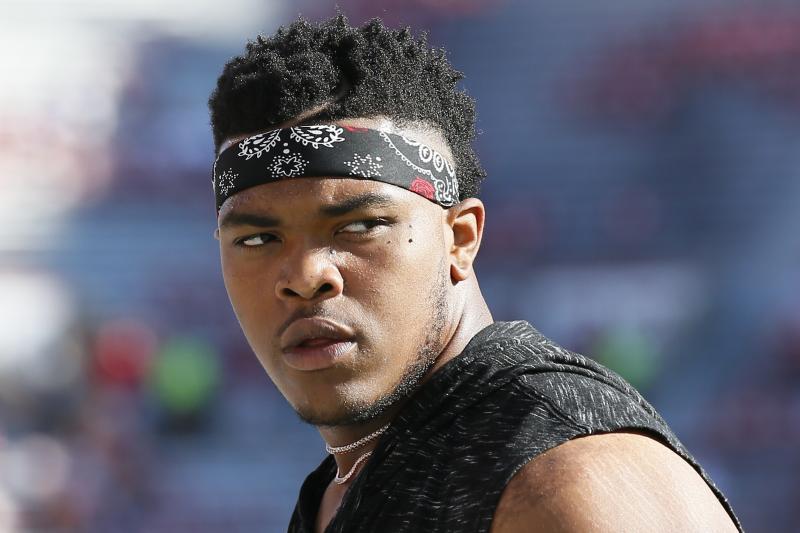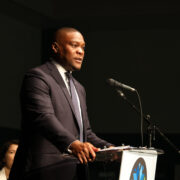
By JASON KING
NORMAN, Oklahoma — Less than an hour before jotting his name on a piece of paper that would alter his life, Orlando Brown and his mother pulled into the parking lot at Sugarloaf Mills Mall just outside Atlanta.
“Buy an Oklahoma hat,” Brown’s high school coach had told him in a frantic phone call around 8 the night before, so the 6’8″, 365-pound senior hurried into the first sporting goods store he saw and plopped down $25 for a crimson Sooners cap with the “OU” logo stitched in white.
Brown had never visited Oklahoma, had never met then-head coach Bob Stoops. But after Tennessee rescinded its scholarship offer 72 hours before national signing day—an unforeseen gut-punch that left the Vols-committed Brown bawling in his coach’s office—it was the Sooners who trusted the word of Brown’s mentors and made room for the offensive lineman in their 2014 recruiting class.
Riding shotgun as his mom rushed him from the mall to his ceremony at Peachtree Ridge High School, Brown could finally relax. Angst and tension had given way to relief and excitement.
Brown entered the gymnasium, walked past a gaggle of TV cameras and reporters and sat behind a table alongside his other college-bound teammates. As the student body applauded, Brown slipped on his new cap and inked his letter of intent less than five minutes after it had shot out of the athletic department fax machine.
“When the ceremony started, the people back at OU were still preparing the scholarship papers,” then-Peachtree Ridge coach Mark Fleetwood said. “That’s how last-minute it was. They sent them over during the ceremony, at the very end. He was our last player to sign.”
Fleetwood laughs.
“I’m telling you,” he said, “the way things unfolded…it was crazy.”
Not just the events that led to Brown becoming a Sooner.
But the path of his entire career.
Now a redshirt junior who has started 38 consecutive games for the Sooners, Brown is regarded as one of the top offensive linemen in all of college football. A host of mock drafts predict he will be a first-round selection should he choose to turn pro in 2018—and one site has him going No. 9 overall.
Impressive as his resume may be, Brown’s accomplishments stand out even more because of the unorthodox journey he took to achieve them.
Long before he became the most feared lineman in the Big 12—opponents voted him as one of the league’s biggest trash-talkers—Brown’s father, a hulking NFL star known as “Zeus,” threatened to leave his eighth-grade game because he’d been playing too passively.
Years before a high-protein diet helped him slim down to 340, Brown was a 415-pound high school sophomore known for ordering late-night pizzas and chugging milk before bed.
Dedication in the weight room has enabled Brown to morph into one of the strongest linemen in the country, but the spring before Brown’s junior season at Peachtree Ridge, he was only squatting the bar.
Even off the field, Brown has gone from one extreme to the other. His 1.7 grade-point-average is among the reasons Tennessee cited when it withdrew its scholarship offer 72 hours before National Signing Day in 2014. After three years at Oklahoma, Brown boasts a 3.0.
“It’s been a long journey,” Brown told B/R. “My whole mindset is to keep getting better. When you reach a certain status in college football, people are happy if you’re just able to maintain. But I don’t want to maintain. I want to continue to improve.
“There are a lot of people I want to make proud.”
Including one person more than anyone else.
THE MOST IMPACTFUL SPEECH Orlando Brown has heard during his football career came before the third contest of his eighth-grade season. And it was delivered not by a coach in a locker room but by his father in the car.
“My dad told me how tired he was of seeing me play so soft,” Brown said. “He was like, ‘If you don’t get more physical out there today—if you don’t finish people—I’m leaving. I’m getting in the car and going home.'”
An hour later, on the first play from scrimmage, Brown drove his opponent 30 yards off the line and dumped him on his back. Only 13 at the time, Brown said he stood 6’6″ and weighed 450 pounds.
“And the guy I was up against was about 370,” Brown said. “Something happened, and I just snapped. I had an edge that I had never felt before. I just took over. It was the first time I’d ever felt something like that.”
After pummeling the lineman to the ground, Brown got up and jumped on him again, drawing a penalty flag from the official—and praise from his father, who was so excited he ran down the steps of the bleachers, hurdled the chain-link fence that separated the stands from the field and ran down the sideline and into the back of the north end zone.
“I’ll never forget it,” Brown said with a laugh. “He was wearing a basketball jersey and a bucket hat, waving a towel and yelling, ‘Yeah, Lando! Yeah, dog! That’s what I’m talking about!’
“When my dad and I talked about football, it was less about fundamentals and more about mentality. It was about imposing your will and dominating the person in front of you. He always said, ‘You play your best when you let your emotions roll.’ If you watch tape of him from the NFL, you can definitely see that he played with that motto.”
Much like his son’s, Orlando Brown Sr.’s rise to football stardom was something few people expected.
Despite standing 6’7″ and weighing 360 pounds, Brown Sr. was passed over by bigger programs during the recruiting process and ended up starring for Central State in Ohio and, later, South Carolina State. He signed with the Cleveland Browns as an undrafted free agent in 1993 and at one point was one of the NFL’s highest-paid offensive linemen.
Disaster struck in 1999, however, when a penalty flag weighted with BBs went through his facemask and struck him in the right eye. Brown initially walked to the sideline, but moments later he returned and pushed referee Jeff Triplette to the ground.
Brown was suspended indefinitely by the league, but the NFL rescinded its ruling when it was determined the errant flag had temporarily blinded him. Alleging the accident had cost him his career because he was released in 2000, Brown sued the league for $200 million and reportedly settled for between $15 and $25 million.
After some time away from the field, he moved to Florida and began training for a comeback. In 2003, he signed with Baltimore and started 35 games for the Ravens before retiring in 2005.

Orlando Brown Sr. crafted a nine-year career in the NFL despite not being drafted.Tom Hauck/Getty Images
“During that time, I saw my dad get really down,” Brown said. “He loved football. It defined who he was. It had become a part of him. Without it, he felt alone. He and my mom ended up separating. There was a stint where I hardly saw him at all because he was down in Florida at IMG training.
“He basically had to start back at the bottom and work his way back up. I learned a lot by watching him go through that process. I learned from all of it, the good and the bad.”
Brown Sr. grew closer with his son after his retirement. They made fishing trips to Chesapeake Bay and spent Sunday afternoons dissecting NFL games from the couch. When his dad went to work at the Fatburger franchise he opened in Elkridge, Maryland, Orlando often came along and bused tables.
Zeus had always been hesitant to let his son play football, but he finally succumbed when Orlando was in the sixth grade and weighed 300 pounds. Based on his size—and probably his genes, too—Orlando was regarded as a Division I prospect by the time he was a sophomore at DeMatha Catholic High School, a private all-boys school in Hyattsville, Maryland. His dad was supposed to accompany him when he took an unofficial visit to Maryland that fall, but he backed out, saying he felt ill.
Orlando returned from the visit and told his father all about it over lunch on Sunday in Baltimore. The following day, Brown Sr. drove his son back to DeMatha and waved goodbye.
Orlando never saw Zeus again.
Four days later, he was summoned from class and told to go to the principal’s office. As he walked through the hall, Orlando checked his phone and saw a tweet that read “Rest in peace, Zeus.” Moments later his mother confirmed the news.
Earlier that day, police had discovered Orlando Claude Brown dead in his home. Autopsy reports released two weeks later indicated he died of diabetic ketoacidosis, an ailment he likely didn’t realize he had. Left untreated, the condition can cause kidney failure, fluid to build up in the brain or a coma.
Zeus was only 40 years old.
“From that point on,” Orlando said, “everything became about honoring him.”
WHEN STOOPS INFORMED HIM that he’d made Orlando Brown a late addition to Oklahoma’s 2014 recruiting class, Oklahoma offensive line coach Bill Bedenbaugh immediately looked up some game tape.
“My first first reaction,” Bedenbaugh said, “was, ‘Wow! This guy isn’t very good.'”
A lot of people had a similar opinion of Brown during his time at Peachtree Ridge in Suwanee, Georgia, about 30 miles northeast of Atlanta. Looking for a “fresh start,” Brown and his family moved to the area three months after their father’s death, but it’d be an understatement to say the switch was an adjustment.
Fleetwood, the coach, said Brown struggled in the weight room during the spring and initially didn’t even add plates to the 45-pound bar while doing squats. In the fall, Brown was so out of sync after two games that Fleetwood thought about benching him. Instead, he summoned Brown into the film room. On a large projection screen, he showed the junior clips of himself and then compared the clips to those of Alex Jauregui, a 6’7″, 330-pound offensive lineman who’d played at Peachtree Ridge a year earlier before signing with Middle Tennessee State. Jauregui was faster, quicker and more explosive.
“When he saw the Hudl clips side-by-side like that, it was obvious,” Fleetwood said. “He was like, ‘Coach, I’m awful.’ I told him, ‘You’re not awful, Orlando, but here’s what’s happening: You weigh 400 pounds, and your body is manipulating you. You’re not manipulating your body. You need to look in the mirror and ask yourself if you really want to keep eating those pizzas late at night or if you want play this game. Which is more important?'”

Peachtree Ridge coach Mark Fleetwood saw the potential Brown had if he could get in better shape.Photo courtesy of Mark Fleetwood
After that day, everything changed.
By the end of the season, Brown had slimmed down to 360. A handful of scholarship offers came afterward, and Brown called a news conference in May to commit to Tennessee and new coach Butch Jones.
“The best thing about Orlando,” Fleetwood said, “was his attitude. He never had an air about him, where he thought he was better than everyone just because his dad played in the NFL. He was willing to work hard. He genuinely wanted to be a good player. He just needed someone to show him how.”
Still, Brown’s naysayers outnumbered his supporters. Fleetwood said schools such as Georgia and Alabama shied away from recruiting Brown because they thought he was a “big slob.”
The disrespect was prevalent in the high school ranks, too. Fleetwood said he had to argue to get Brown a spot in a citywide all-star game following his senior season. And he fumed during a meeting of area coaches after Brown failed to garner enough votes to make the All-Gwinnett County team.
“I just said, ‘You’re wrong, guys. You’re totally wrong. He’ll be a first-round draft choice if he continues on the path he’s been on this past year. You mark my words.'”
During the latter half of Brown’s senior season, the staff at Tennessee—the school he’d committed to that spring—began calling less and less. And by the time he took his official visit a week before signing day, Brown hadn’t spoken with any of the coaches in weeks.
According to Fleetwood, Tennessee had accepted too many commitments and had to turn people away. Brown, partially because of his sub-2.0 GPA, was one of the victims. He wasn’t informed until he was on campus for his visit the Sunday before signing day.
“I called Butch,” Fleetwood said, “and I said, ‘Butch, this is dirty. You knew what you were going to do to this kid, and you waited until three days before signing day. What are you trying to do?’ He got all pissed at me and tried to make excuses, and I said, ‘Thank you. Goodbye.'”

Orlano Brown is expected by many to be a first-round draft pick in the spring if he opts to leave Oklahoma a year early. Sue Ogrocki/Associated Press
Fleetwood said Brown was “bawling, embarrassed” because he didn’t have anywhere to go.
“Hang tough,” his coach told him. “I know enough people. I’ll get this done for you. You’re going to be OK.'”
Fleetwood, who had met Stoops years earlier when Fleetwood was an assistant at Troy University, called the Oklahoma coach and convinced him to give Brown a shot. Brown had never met Stoops, but they’d talked on the phone about a year earlier. Brown remembered his father had always talked about how well-conditioned Oklahoma players were when they arrived in the NFL—guys like Kelly Gregg and Dan Cody and Mark Clayton, all of whom had been his teammates.
A few years before Zeus died, he’d told Orlando that, if he was ever good enough to play in college, he should consider the Sooners.
“Now it was actually happening,” Orlando said.
The initial thought was that Brown’s subpar GPA would force him to spend two seasons in junior college before he could enroll at OU. Fleetwood and Stoops even discussed schools that may have been a good fit. Brown, though, was adamant about heading straight to Norman.
“I’m not going to junior college,” he told Fleetwood. “There’s no way.”
Sure enough, Brown finished his senior academic year strong and then completed the necessary coursework during the summer to qualify for Oklahoma. He redshirted his first season and impressed the coaches with his work ethic.
During August two-a-days leading into the 2015 season, Brown beat out a fifth-year senior, Josiah St. John, for a spot on the Sooners’ first-team offensive line. He’s started every game since.
“Within one year—hell, within a half-year—he changed everyone’s opinion,” Bedenbaugh said. “The thing that’s impressive is how hard he works. He’s a good athlete but not an incredible one. What he’s done hasn’t come naturally. He’s had to grind for it. You want to see kids like that succeed.”
Brown said one of the best things that’s happened to him in Norman is the relationship he’s built with former Sooners offensive lineman Jammal Brown. The 2004 Outland Trophy winner and No. 13 overall draft pick in 2005 has become a mentor to him. The two talk on the phone every single night, without fail.

Orlando with Jammal Brown, who has tried to help Brown become a healthier, better player.Photo courtesy of Orlando Brown
Jammal Brown said he’d met Orlando years earlier, when he was in elementary school. Jammal was working at a football camp hosted by Orlando’s father.
“He made an impression on me because he asked so many questions,” Jammal Brown said. “You could tell he had an eagerness to learn.
“He knows his dad was a mauler, but he also understands his dad wasn’t the best football technician. He wants to be physical like his dad, but he wants to have a higher football IQ. Times have changed. Stuff like that is more important now than ever.”
Orlando agreed. Though he plays left tackle for Oklahoma, there are some pundits who question whether he’s athletic enough to play the position at the next level. The mere suggestion he’ll play the less glamorous right tackle as a pro “drives Orlando crazy,” Jammal Brown said. But it also motivates him.
“When my dad played, schematically, things were a lot different,” Orlando said. “It was more traditional, power stuff. He was a much better athlete than I am. He definitely moved better. I don’t know why I didn’t get that trait. But I’ve got longer arms than him, and I’ve got his punch.”
When they’re not talking about football, Jammal and Orlando discuss fashion. Jammal has long been known as a snappy dresser, and he’s shown Orlando—who is obsessed with Uggs—that weighing 300-plus pounds “doesn’t mean you can’t have swag.”
Jammal talks to Orlando about other things, too, like treating women with respect. More than anything, though, Jammal has given Orlando tips about how to monitor his diet.
The NFL doesn’t want a guy with weight problems, he tells him.
Whether it’s drinking water instead of lemonade, staying away from bread, eliminating ranch dressing and bacon bits from salads or eating chicken sausages instead of pork links, Jammal has shown Orlando how subtle changes can make big differences in his weight.

After Tennessee rescinded its offer to Brown, Mark Fleetwood, his high school coach convinced Bob Stoops to add Brown to Oklahoma’s 2014 recruiting class.Sue Ogrocki/Associated Press/Associated Press
“A lot of the problem,” Jammal said, “was just his lack of knowledge about that kind of stuff.”
Now listed at 345 pounds, Brown is still working to improve his body. His coaches said they’re no longer as concerned with him losing weight as they are with him redistributing it, as Brown can still get a lot stronger.
The improvements he’s made thus far—especially when it comes to athleticism, footwork and flexibility—have been good enough to catch the eyes of NFL scouts. So likely is Brown to leave a year early that he is planning to participate in senior day ceremonies prior to Oklahoma’s final home game.
“If he decides to come back,” Jammal Brown said, “he can just do it again.”
Whether he turns pro after this season or next, and whether he’s the No. 1 overall pick or an undrafted free agent, Brown’s mindset when he’s on the field will stay the same.
“Just going out there every day with the No. 78 and ‘Brown’ on my back is good enough for me,” he said. “I try to go out there and try to dominate every play. I don’t want to let my brothers up front down. I don’t want to let this team down, and I don’t want to let my dad down.
“Knowing what my dad would want—how he’d want me to act and handle things—that fuels me every day. I’m just trying to make him proud.”
Jason King is a senior writer for B/R. A former staff writer at ESPN.com, Yahoo Sports and the Kansas City Star, King’s work has received mention in the popular book series The Best American Sportswriting. In both 2015 and 2016, King was tabbed as one of the top five beat writers in the nation by the APSE. Follow him on Twitter: @JasonKingBR.









